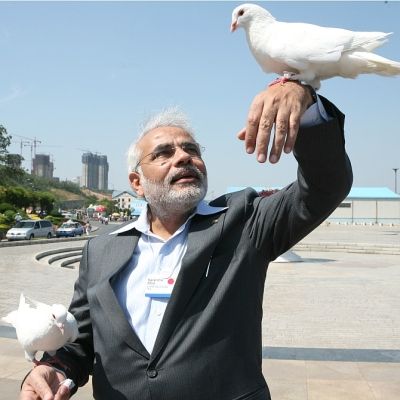'A foot-in-mouth disorder seems to grip the government, and is growing chronic by the day,' says Sunil Sethi.
 It's another exultant week overseas in the life of the prime minister. But as he moves on from the delight of a cherubic choir of Irish kids chanting Sanskrit shlokas to an expected 18,000-strong audience in San Jose, California, this weekend, the mood in New Delhi is skittish, overcast by the looming election in Bihar.
It's another exultant week overseas in the life of the prime minister. But as he moves on from the delight of a cherubic choir of Irish kids chanting Sanskrit shlokas to an expected 18,000-strong audience in San Jose, California, this weekend, the mood in New Delhi is skittish, overcast by the looming election in Bihar.
A foot-in-mouth disorder seems to grip the government, and is growing chronic by the day. Ministers, public officials, and the ruling party's ideologues make a habit of shooting from the lip. The finessed clarifications and embarrassed retractions to half-baked policy pronouncements are so many that Narendra Modi's new slogan should be, 'Maximum utterance, minimum governance.'
A day after the Nosey Parker State stirred up a hornet's nest over accessing records of the public's cell phone records, Telecom Minister Ravi Shankar Prasad had to swiftly backtrack, swear it was a draft proposal, and quickly press the delete button. The idea was badly mistimed: Bang on the eve of the prime minister's descent on Silicon Valley to make a 'Digital India' pitch to the global lords of high-tech finance.
It also confirmed the minister's short-term memory loss at having to switch 857 porn sites back on after a ban that aroused public anger and a rap from the Supreme Court on barging into people's private viewing.
Mr Prasad is a sharp-talking lawyer accustomed to slithering out of dark corners. But even he had some hairy moments when RSS supremo Mohan Bhagwat proffered his opinion on reviewing Constitutional quotas for SCs, STs and other reservations. The BJP had to rush for the delete button again at the disastrous effect of Mr Bhagwat's words on a crucial, caste-configured Bihar poll.
The government's hands are so tied in slapping down loose-cannon ideas and off-the-wall statements by its RSS cohorts that it can't move forward. As a result, some bureaucrats tend to behave like mice at play when the cat is away.
Consider the case of Yudhvir Singh Malik, an IAS officer of the Haryana cadre who suddenly shot to fame when he took over as CEO of the Food Safety & Standards Authority of India last September and, as chief food regulator, banned Maggi noodles.
The long-drawn-out Maggi mess damaged the prime minister's 'Make in India' slogan with embarrassing losses -- in foreign investment, court battles and international image. Its fallout became apparent this week when Mr Malik was banished to the backwaters of the NITI Aayog, formerly the Planning Commission, a kind of bureaucratic Gulag which Mr Modi had promised to cut to size.
Ironically, published this month is a bitingly frank memoir by Arun Maira, (An Upstart in Government; Rupa, Rs 450), former India head of Boston Consulting Group, who describes what went on in this obsolete relic housed when he was brought in as a reformist member by the UPA government.
As he tells it, the place was packed with useless minions, bossed about by self-important officials who resented management professionals in their safe house-cum-retirement home. Mr Maira has written a convincing story about the self-perpetuating detritus of government.
The animus between government and specialists has caused more visible wreckage in cultural institutions. The recent destruction by textile ministry officials of a one-of-its-kind chamber painted by the late Madhubani artist Ganga Devi at the Crafts Museum has provoked widespread condemnation.
The well-known crafts activist Laila Tyabji has argued that the murals could ave been saved by professional restorers: 'They (bureaucrats)] simply don't know much about the matter and take knee-jerk decisions without asking anyone or thinking them through.' Ms Tyabji, who is on the museum's advisory board, says, 'Unfortunately, we were not consulted. The last meeting I attended was in mid-2014.'
In essence, the students'strike at the Film & Television Institute of India, now over 100 days old, reflects the same tension. Why is the government incapable of finding an individual of irreproachable merit and proven ability to head the country's premier mass media school?
Indian cinema, one of the largest, most energetic and influential entertainment industries in the world, is also home to a vast, invaluable pool of creative young professionals.
Moreover, films and television are no longer a soft 20th century power. Their future is indisputably digital. When he steps out into California's sunshine Narendra Modi may remember that its oldest, most enduring product is Hollywood. The FTII at home is a crucible for both 'Make in India' and 'Digital India'.
If it fails so will his mantra of 'Minimum government, maximum governance'. It may end up as 'Maximum utterance, minimum governance.'











